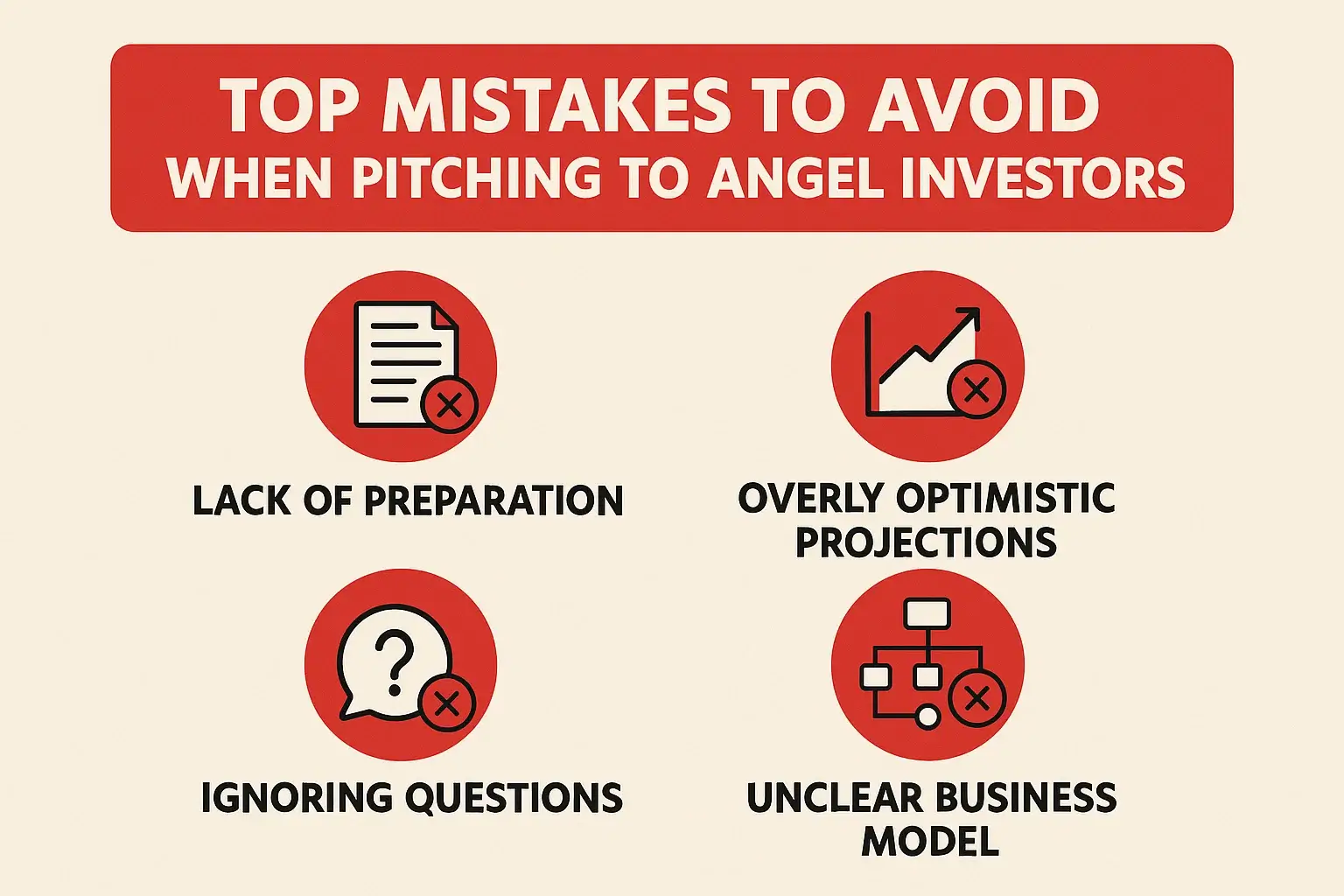Top Mistakes to Avoid When Pitching to Angel Investors

Top Mistakes to Avoid When Pitching to Angel Investors
A must-read 2025 guide for startup founders on avoiding critical mistakes when pitching to angel investors. Learn how to prepare, present, and communicate effectively to secure funding—optimized for high CPC keywords such as angel investor pitch mistakes, startup fundraising tips, investor presentation errors, and early-stage funding advice to maximize SEO and ad revenue.
Table of Contents
- Introduction: The Importance of a Strong Angel Investor Pitch
- Common Mistakes Made When Pitching Angel Investors
- Lack of Preparation and Research
- Unclear Value Proposition
- Overpromising and Unrealistic Projections
- Underestimating the Importance of Team
- Poor Communication and Storytelling
- Ignoring the Investor’s Perspective
- Inadequate Financial Understanding and Clarity
- Not Demonstrating Traction or Market Validation
- Neglecting to Prepare for Tough Questions
- Failing to Follow Up Properly
- How to Avoid These Mistakes
- Best Practices for a Winning Angel Pitch
- Frequently Asked Questions
- Conclusion
Introduction: The Importance of a Strong Angel Investor Pitch
Pitching to angel investors is often the first critical step in securing funding for your startup. A well-crafted pitch not only communicates your vision and potential but also builds trust and enthusiasm. In 2025, with increasing competition for angel investment, avoiding common pitfalls can dramatically increase your chances of success and the size of your investment.
Common Mistakes Made When Pitching Angel Investors
Many founders unknowingly commit errors that reduce investor confidence or fail to demonstrate the full potential of their startup. Recognizing and correcting these mistakes equips you to deliver a compelling, credible, and persuasive pitch.
Lack of Preparation and Research
- Not understanding the angel investor’s interests, portfolio, and investment thesis.
- Failing to customize your pitch to the investor’s focus area or geographic preference.
- Insufficient rehearsal leading to rambling or unclear presentations.
Unclear Value Proposition
Investors need to immediately understand the unique problem your startup solves and why your solution stands out. Vague or overly technical explanations without business relevance weaken your case.
Overpromising and Unrealistic Projections
- Making exaggerated claims about market size or revenue without evidence.
- Presenting growth forecasts that ignore market risks or conservative estimates.
- Ignoring potential challenges or competition, giving the impression of naivety.
Underestimating the Importance of Team
Angel investors invest in teams as much as ideas. Failing to highlight key team members’ skills, experience, and commitment is a critical omission.
Poor Communication and Storytelling
- Using jargon or overly complex language that confuses listeners.
- Lacking a clear narrative arc — problem, solution, validation, and ask.
- Not engaging the investor emotionally or intellectually.
Ignoring the Investor’s Perspective
Failing to address how investors will make a return or the exit strategy weakens confidence. Demonstrating understanding of investor goals shows maturity.
Inadequate Financial Understanding and Clarity
- Insufficient detail on use of funds, burn rate, and runway.
- Confusing or missing breakdown of revenue streams and unit economics.
- Lack of preparedness on potential questions about financial assumptions.
Not Demonstrating Traction or Market Validation
Showing market validation with data, pilot customers, revenue, or user growth instills confidence that your business is viable and scalable.
Neglecting to Prepare for Tough Questions
Investors will challenge your assumptions to test your knowledge and adaptability. Unpreparedness or evasion damages credibility.
Failing to Follow Up Properly
After the pitch, it’s vital to maintain professional follow-up to answer outstanding questions, provide requested data, and demonstrate commitment.
How to Avoid These Mistakes
- Conduct thorough investor research to tailor pitches.
- Practice presentations with mentors, advisors, and peers.
- Prepare clear, concise decks focused on value and key metrics.
- Be honest and realistic about challenges and risks.
- Highlight your team’s capabilities and experience clearly.
- Anticipate common investor questions and rehearse answers.
- Plan structured follow-up communications post-meeting.
Best Practices for a Winning Angel Pitch
- Start with a compelling story that hooks the investor.
- Focus on the problem and your unique solution early.
- Provide market data and competitive analysis.
- Highlight traction with quantifiable evidence.
- Show your business model and financial forecasts clearly.
- Introduce your team with relevant backgrounds.
- Clearly state your funding needs and use of proceeds.
- Close with a strong call to action—invite questions and next steps.
Frequently Asked Questions
Q1: How long should my pitch to angel investors be?
Ideally, keep your pitch between 10-15 minutes, leaving time for Q&A and discussion.
Q2: What is the most common mistake founders make when pitching?
Failing to connect the product with a clear market need and overloading slides with data rather than a story.
Q3: How important is the pitch deck design?
Very important—clean, professional designs aid clarity and engagement but prioritize substance over style.
Q4: Should I share my entire business plan in the pitch?
No, focus on key points; detailed plans can be shared upon request during due diligence.
Q5: How do I handle tough or unexpected investor questions?
Be honest if you don’t know, offer to find answers, and demonstrate willingness to learn and adapt.
Conclusion
Avoiding the top mistakes when pitching to angel investors is essential for securing early funding and building investor confidence in 2025. With thorough preparation, clear communication, honest storytelling, and a focus on investor needs, your startup can maximize its chances of winning support and accelerating growth. Start crafting your winning pitch today and turn potential investors into committed partners.
Comments (3)